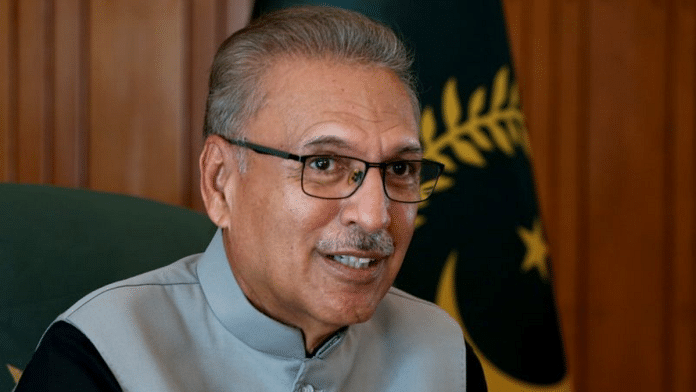New Delhi: There seems to be no end to the uncertainty over the dates for Pakistan’s next general election.
Now, while President Arif Alvi has offered “advice” to the Election Commission of Pakistan (ECP) on the matter, the latter has said it has sole discretion on deciding election dates.
Pakistan was due to hold elections this year to elect its next federal government (as well as provincial administrations), but a host of twists and turns appears to have thrown the schedule off by several months.
The Pakistan National Assembly — the lower house of its parliament — was dissolved by the president on 9 August, three days before its term was to expire. Constitutionally, this set off a 90-day countdown for Pakistan to hold the elections.
However, right before the dissolution, the then Shehbaz Sharif government notified the latest census, which mandated the ECP to conduct a delimitation exercise across the country before the next election
Politicians including Pakistan Tehreek-e-Insaf (PTI) chief Imran Khan and Pakistan Peoples Party (PPP) leader Bilawal Bhutto-Zardari have been demanding immediate announcement of the next poll dates.
The ECP has so far not announced the dates, with the general elections now expected to be held after the delimitation is completed.
Pakistan’s caretaker Prime Minister Anwaar-ul-Haq Kakar Sunday, citing the “alarming” situation on the country’s borders, sought to reassure the public that such circumstances would not obstruct the process of general elections.
There are questions surrounding the military’s role in the imbroglio over election dates, following speculation that polls now could turn in favour of jailed former PM Imran Khan — the military’s once-blue-eyed-boy — and his PTI.
In this article, ThePrint looks at the ongoing “tussle” on who holds the power to announce election dates, and where it stems from.
Also Read: Why Pakistan rupee depreciated dramatically under caretaker PM’s first 3 weeks in power
What President Alvi’s letter observed
Alvi’s letter came amid reports in Pakistani media that the president is expected to “announce the election date anytime”.
In a 13 September letter to the ECP, the president said that he had dissolved the National Assembly on the PM’s advice on 9 August.
According to a report in the Pakistani daily Dawn, “The president cited Article 48(5) of the constitution, which he said empowers and mandates the president ‘to appoint a date not later than 90 days from the date of the dissolution, for the holding of a general election to the assembly’.”
Hence, “in terms of Article 48(5), the general election to the National Assembly should be held by the 89th day of the date of dissolution of the National Assembly, i.e. Monday, 6th day of November 2023”, the letter added, as quoted in Dawn.
The president acknowledged that it was the ECP’s responsibility to conduct free and fair elections, and sought to advise the poll panel to announce the poll date.
What the law says
According to Article 224 of the Pakistan constitution, after the National Assembly was dissolved and the caretaker government under Kakar assumed power, it became responsible for ensuring the smooth transition of power through free and fair elections within 90 days, i.e. by 9 November.
Under Article 48(5) of the constitution, the president is required to announce the date for general elections.
However, in June, the Pakistan parliament passed an amendment giving the Election Commission of Pakistan powers to unilaterally announce poll dates without consulting the president.
With the Elections (Amendment) Bill 2023, Sections 57 and 58 of the Elections Act, 2017, were altered to allow the ECP to announce the date for general elections as well as make changes to the election programme.
According to the object of the bill, the Pakistan constitution views the organisation of free and fair elections as the duty of the ECP.
The ECP also had the power to organise elections under the 1973 constitution. However, in 1985, through the 8th constitutional amendment, then President General Zia-ul-Haq centralised the power to announce poll dates to the president and governors.
The 26 June amendment, according to the then law minister Azam Nazir Tarar, was brought to remove “ambiguities” in the process.
The question of whether the constitution holds primacy or the new law remains a subject of debate, with many experts saying that the constitution does hold precedence.
Even so, many such as interim PM Kakar have criticised Alvi’s move, describing the announcement of election dates as the mandate of the ECP.
Chief Election Commissioner (CEC) Sikandar Sultan Raja insists that it is the mandate of the ECP to announce poll dates and Article 224 is not applicable in this case.
In a letter last month, responding to an invitation from Alvi for a meeting to discuss elections, the CEC stated, “Where the president dissolves the National Assembly, in his discretion, as provided in Article 58(2) read with Article 48(5) of the constitution then he has to appoint a date for the general elections.”
“However, if the assembly is dissolved on the advice of the prime minister or by afflux of time as provided in Article 58(1) of the constitution, then the commission understands and believes that power to appoint a date or dates for elections rests exclusively with the commission,” Raja added.
Many expect that polls in Pakistan will now be held early next year, with interim PM Kakar saying earlier this month that general elections could be conducted prior to January-February 2024.
The US has urged Pakistan to hold “timely” elections, and the UK envoy has also stressed the need for free and transparent polls.
Pakistan, which has suffered multiple coups, saw its first democratic transition of power only 10 years ago, in 2013.
Also Read: Pakistan is banking on $3bn IMF loan, but it might just buy time, not solve debt crisis



